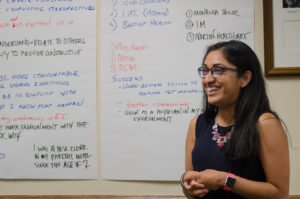KPLI Grad Monalisa Tailor, M.D., Says Program Helps Physicians “Serve as a Voice to Care for and Advocate for our Patients”
 We asked Monalisa Tailor, M.D., with Norton Community Medical Associates: Barret in Louisville, to tell us about her experience participating in KMA’s Kentucky Physicians’ Leadership Institute (KPLI), the premier leadership training program for Kentucky physicians. She’s also a graduate of the Community Connector Leadership Program, a KMA program that helps physicians enhance their leadership skills through education and direct community involvement.
We asked Monalisa Tailor, M.D., with Norton Community Medical Associates: Barret in Louisville, to tell us about her experience participating in KMA’s Kentucky Physicians’ Leadership Institute (KPLI), the premier leadership training program for Kentucky physicians. She’s also a graduate of the Community Connector Leadership Program, a KMA program that helps physicians enhance their leadership skills through education and direct community involvement.
- What made you want to participate in KPLI?
KPLI was appealing because it was specific for physicians and physician issues.
- How would you describe the leadership training you received prior to this program?
I have previously done leadership training through the Leadership Louisville Center. We were able to develop personal skills and help a local nonprofit through the Ignite Louisville program. Many of the sessions were done with existing businesses in our area and are part of their own leadership training.
- Did you have any specific expectations going into the program? What did you hope to learn?
I was hoping to get a better understanding of the current status of healthcare and garner a better understanding of the business aspect of medicine.
- What was the most interesting or surprising part of the program?
I was not sure what to expect before the program. Our class was a spectrum of individuals of different ages, different specialties, and different parts of the state. But we had a common goal of learning and improving our personal leadership skills which made it a great experience for all of us.
- The opioid epidemic was the focus of this year’s Leadership in Action session. What was your knowledge base of this crisis prior to KPLI? What was the most challenging part about covering that topic?
I knew how hard the opioid epidemic had hit our community from Louisville Metro Department of Public Health and Wellness Medical Director Dr. Sarah Moyer’s reports at our GLMS Board meetings and updates from The Healing Place President Karyn Hascal. I have also seen quite a few patients who are in recovery and healing following opioid abuse. The most challenging aspect of the opioid epidemic is how multifactorial it is in terms of causation and effects. How can you fix so many things? It is also difficult because it affects a family on all levels. A lot of individuals hit the hardest are young, and their substance abuse affects their parents and their children.
- What were your major “takeaways” from KPLI?
Health care is complicated, and increasingly the people making the decisions about medicine are not people who actively engage in patient care every day. Physicians, through a program like KPLI, can serve as a voice to care for and advocate for our patients and become part of the decision-making process whether that is in our respective health care systems or with our lawmakers.
- What are your plans for applying the skills you learned from KPLI to your practice or daily life?
I have utilized many of the communication skills we garnered from KPLI, and use them daily in my conversations with my patients and with staff.
- Do you feel there is anything about the program that needs to be improved?
I wish it could be six sessions instead of four to have more time to cover additional topics. The program is very well done and inspires physicians to become better thinkers.
- What would your advice be for physicians considering applying?
Be open-minded that this will help improve your skills on a personal level, regardless of your overall end goal.